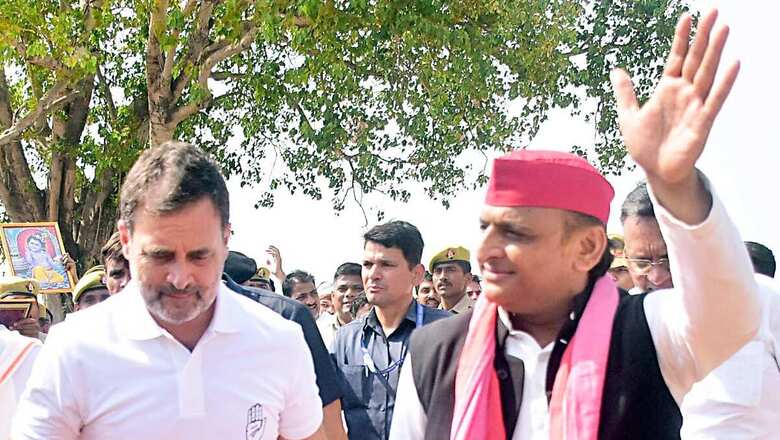
views
Is the INDIA bloc tempo still up or has it lost some of the election high amid questions over its unity in the face of lack of support for Arvind Kejriwal and Hemant Soren? The upcoming bypolls to 10 Uttar Pradesh Assembly seats may answer the question.
Leaders of both the Samajwadi Party (SP) and the Congress had unofficially announced their alliance not only for the bypolls but also for the 2027 Uttar Pradesh elections, for which the upcoming bye-elections have been billed as the trailer. The bypolls will also be a test of whether the slump in BJP’s Lok Sabha seat tally in the state will have any bearing on the Assembly seats.
The Election Commission is yet to announce the schedule for the bypolls but political parties in Uttar Pradesh have started the preparations. The 10 Assembly seats are the ones vacated by MLAs who contested and won the Lok Sabha elections.
“Our preparations are on. Talks over seat-sharing are in progress. Top-level leaders of both the parties (Congress and SP) are in touch. We will continue to fight in alliance with the SP under the INDIA bloc. We will win the bypolls on all the seats the way we defeated the BJP in the 2024 Lok Sabha elections on a majority of seats,” said Congress UP spokesperson Anshu Awasthi.
Awasthi said the SP-Congress alliance will secure more than 300 seats in the 403-member UP Assembly in 2027 elections as well. Congress’s UP president Ajay Rai, who contested the Lok Sabha elections from Varanasi against Prime Minister Narendra Modi, too said the SP and Congress would fight the bypolls together.
Samajwadi Party chief spokesperson Rajendra Chaudhary echoed similar sentiments. “Our alliance with the Congress will continue and we will continue to win in the bypolls,” he said.
On the other hand, the BJP, having suffered a big setback in Lok Sabha elections, is gearing up for a massive ground campaign to boost cadre morale and reach the voters. “We will fight bypolls with full spirit and will retain almost all the seats,” said BJP spokesperson Manish Dixit.
Among the seats that will head to bypolls is SP chief Akhilesh Yadav’s Karhal Assembly constituency that was vacated to retain the Kannauj Lok Sabha seat. Other vacant seats include Khair (Aligarh), Kundarki (Moradabad), Katehari (Ambedkar Nagar), Phulpur (Prayagraj), Ghaziabad (Ghaziabad), Majhawan (Mirzapur), Meerapur (Muzaffarnagar), and Milkipur (Ayodhya).
According to political analysts in Uttar Pradesh, the Congress-SP may pose a formidable challenge to the ruling BJP. “I don’t think that countering SP-Congress alliance would be that easy for BJP now, especially when the caste dynamics and majority of people went in favour of INDIA on many seats, bringing down the BJP’s (Lok Sabha) tally (in Uttar Pradesh) to 33. Also, boosting the morale of the party cadre after its performance in the 20204 Lok Sabha polls would be challenging task for the BJP,” said Shashikant Pandey, Head of the Department of Political Sciences at Dr Bhimrao Ambedkar University in Lucknow.
In the Lok Sabha elections, the INDIA bloc secured seats not only in its traditional strongholds, the Yadav-dominated areas of Etah, Etawah, Firozabad, Mainpuri, and Kannauj, but also in the Bundelkhand region, central and east Uttar Pradesh. These regions are primarily dominated by Other Backward Classes (OBCs) such as Kurmi, Maurya, Shakya, Kushwaha, Rajbhar, and Nishad communities, as well as Dalit communities, including Jatavs, Pasis, Koris, Valmikis, and Dhobis.
The INDIA bloc garnered a substantial chunk of voters from OBCs, Extremely Backward Classes (EBC), and Dalit voters, countering the Bharatiya Janata Party’s efforts to consolidate its OBC vote base through alliances with Anupriya Patel’s Apna Dal (S), Om Rajbhar’s Suheldev Bharatiya Samaj Party (SBSP) and Sanjay Nishad’s NISHAD party.
Caste politics played a crucial role in the 27 Lok Sabha seats that were contested in the sixth and seventh phases of the general elections. Out of these 27 seats, the National Democratic Alliance secured victory in 10, while the INDIA bloc won 17. The Samajwadi Party and the Congress not only secured victory in 43 seats, but also increased their vote share. The SP, which had won five seats in the 2019 Lok Sabha elections with a 18.11% vote share, increased its tally to 37 seats and its vote share to 33.59%. The Congress, which had won one seat in 2019 with 6.36% vote share, increased its tally to six seats and its vote share to 9.46% in 2024.
The NDA experienced a significant setback, with a decline in both seat tally and vote share. The BJP’s vote share decreased from 49.98% in 2019 to 41.37% in 2024. The Apna Dal (S) saw its vote share shrink from 1.21% in 2019 to 0.92% now and won only one seat.
The Bahujan Samaj Party (BSP), which contested solo, also faced a substantial decline, with its vote share dropping from 19.43% in 2019 to 9.39% with zero seats.
In a notable shift, the SP, which had not won any reserved seats in 2019, secured seven reserved seats, while its ally Congress won one reserved seat. In 2019, all reserved seats were won by the BJP, BSP, and Apna Dal (S).




















Comments
0 comment